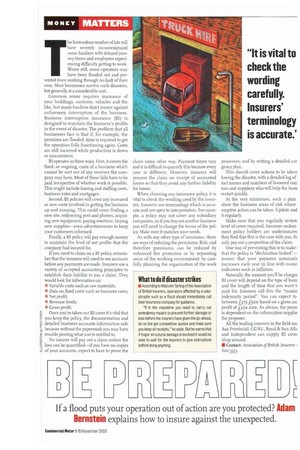MONEY MATTERS T he horrendous weather of late will have severely
Page 45

If you've noticed an error in this article please click here to report it so we can fix it.
inconvenienced some hauliers with delayed journey times and employees experiencing difficulty getting to work. Worse still, some operators may have been flooded out and prevented from working through no fault of their own. Most businesses survive such disasters, but generally at a considerable cost.
Common sense requires insurance of your buildings, contents, vehicles and the like, but many hauliers don't insure against unforeseen interruption of the business. Business interruption insurance (BI) is designed to maintain the business's profits in the event of disaster. The problem that all businesses face is that if, for example, the premises are flooded, time is required to get the operation fully functioning again. Costs are still incurred while production is down or non-existent.
B I operates in three ways. First, it covers the fixed, or ongoing, costs of a business which cannot be met out of any reserves the company may have. Most of these bills have to be paid irrespective of whether work is possible. This might include leasing and staffing costs, business rates and mortgages.
Second, RI policies will cover any increased or new costs involved in getting the business up and running. This could cover finding a new site, redirecting post and phones, acquiring new equipment, paying overtime, buying new supplies—even advertisements to keep your customers informed.
Finally, a B! policy will pay enough money to maintain the level of net profits that the company had insured for.
If you need to claim on a BI policy, remember that the insurers will need to see accounts before any payments are made. Insurers use a variety of accepted accounting principles to establish their liability to pay a claim. They would look for information on;
+ Variable costs such as raw materials; + Data on fixed costs such as business rates; + Net profit; + Revenue levels; + Gross profit.
Once you've taken out BI cover it's vital that you keep the policy, the documentation and detailed business accounts information safe because without the paperwork you may have trouble proving what you're entitled to.
No insurer will pay out a claim unless the loss can be quantified—if you have no copies of your accounts, expect to have to prove the claim some other way. Payment times vary and it is difficult to quantify this because every case is different. However, insurers will process the claim on receipt of accounted losses so that they avoid any further liability for losses.
When choosing any insurance policy, it is vital to check the wording used by the insurers. Insurers use terminology which is accurate and not open to interpretation. For example, a policy may not cover any subsidiary companies, so if you buy out another business you will need to change the terms of the policy. Make sure it matches your needs.
As with any other type of insurance, there are ways of reducing the premiums. Risk, and therefore premiums, can be reduced by enhanced fire protection or by separating areas of the working environment; by carefully planning the organisation of the work processes; and by writing a detailed cos gency plan.
This should cover actions to he taken lowing the disaster, with a detailed log of tact names and numbers of favoured coni tors and suppliers who will help the busii restart quickly.
At the very minimum, such a plan show the business areas of risk where emptive action can be taken. Update and it regularly.
Make sure that you regularly review level of cover required. Insurers reckon most policy holders are underinsure( they find that this is the case with you, th only pay out a proportion of the claim.
One way of preventing this is to make that the policy is "declaration linked"— means that your payment automatic increases each year in line with econe indicators such as inflation.
Naturally, the amount you'll be charge( BI cover will depend on the type of bush and the length of time that you want ti paid for. Insurers call this the "maxin indemnity period". You can expect to between £375-koo based on a gross an] profit of Lz5o,000_ As always, the prem is dependent on the information supplie the proposer.
All the leading insurers in the field suc Axa Provincial, CGNU, Royal 8( Sun Alli: and Independent can supply BI cove] shop around.
• Contact: Association of British Insurers: ■ 600 3333.




































































































